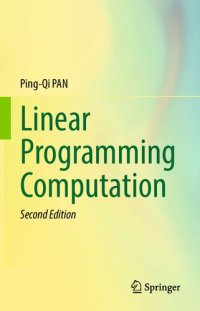
Ebook: Linear Programming Computation
Author: Ping-Qi Pan
- Genre: Computers // Programming
- Year: 2023
- Publisher: Springer
- City: Singapore
- Edition: 2
- Language: English
- pdf
This monograph represents a historic breakthrough in the field of linear programming (LP)since George Dantzig first discovered the simplex method in 1947.
Being both thoughtful and informative, it focuses on reflecting and promoting the state of the art by highlighting new achievements in LP. This new edition is organized in two volumes. The first volume addresses foundations of LP, including the geometry of feasible region, the simplex method and its implementation, duality and the dual simplex method, the primal-dual simplex method, sensitivity analysis and parametric LP, the generalized simplex method, the decomposition method, the interior-point method and integer LP method. The second volume mainly introduces contributions of the author himself, such as efficient primal/dual pivot rules, primal/dual Phase-I methods, reduced/D-reduced simplex methods, the generalized reduced simplex method, primal/dual deficient-basis methods, primal/dual face methods, a new decomposition principle, etc.
Many important improvements were made in this edition. The first volume includes new results, such as the mixed two-phase simplex algorithm, dual elimination, fresh pricing scheme for reduced cost, bilevel LP models and intercepting of optimal solution set. In particular, the chapter Integer LP Method was rewritten with great gains of the objective cutting for new ILP solvers {it controlled-cutting/branch} methods, as well as with an attractive implementation of the controlled-branch method.
In the second volume, the `simplex feasible-point algorithm' was rewritten, and removed from the chapter Pivotal Interior-Point Method to form an independent chapter with the new title `Simplex Interior-Point Method', as it represents a class of efficient interior-point algorithms transformed from traditional simplex algorithms. The title of the original chapter was then changed to `Facial Interior-Point Method', as the remaining algorithms represent another class of efficient interior-point algorithms transformed from normal interior-point algorithms. Without exploiting sparsity, the original primal/dual face methods were implemented using Cholesky factorization. In order to deal with sparse computation, two new chapters discussing LU factorization were added to the second volume. The most exciting improvement came from the rediscovery of the reduced simplex method. In the first edition, the derivation of its prototype was presented in a chapter with the same title, and then converted into the so-called `improved' version in another chapter. Fortunately, the author recently found a quite concise new derivation, so he can now introduce the distinctive fresh simplex method in a single chapter. It is exciting that the reduced simplex method can be expected to be the best LP solver ever.
With a focus on computation, the current edition contains many novel ideas, theories and methods, supported by solid numerical results. Being clear and succinct, its content reveals in a fresh manner, from simple to profound. In particular, a larger number of examples were worked out to demonstrate algorithms. This book is a rare work in LP and an indispensable tool for undergraduate and graduate students, teachers, practitioners, and researchers in LP and related fields.